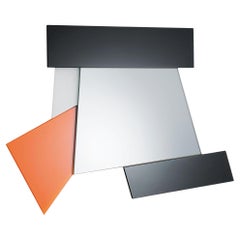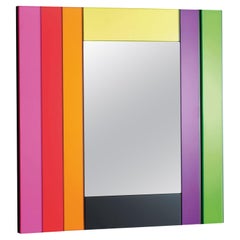Gli Specchi Di Dioniso
21st Century and Contemporary Italian Modern Wall Mirrors
Mirror
21st Century and Contemporary Italian Modern Wall Mirrors
Mirror
21st Century and Contemporary Italian Modern Wall Mirrors
Mirror
Early 2000s Italian Mid-Century Modern Wall Mirrors
Art Glass, Mirror
Early 2000s Italian Post-Modern Wall Mirrors
Art Glass, Mirror, Cut Glass, Wood
Recent Sales
1990s European Modern Wall Mirrors
Glass
Early 2000s Italian Post-Modern Wall Mirrors
Cut Glass, Mirror, Wood
Early 2000s Italian Minimalist Wall Mirrors
Cut Glass, Mirror, Wood
Early 2000s Italian Post-Modern Wall Mirrors
Mirror
21st Century and Contemporary Italian Wall Mirrors
Glass, Mirror
Early 2000s Italian Post-Modern Wall Mirrors
Art Glass, Wood, Cut Glass, Mirror
Early 2000s Italian Post-Modern Wall Mirrors
Wood, Art Glass, Mirror
People Also Browsed
2010s South African Minimalist Pedestals
Hardwood
21st Century and Contemporary Italian Modern Sofas
Wool, Cotton
2010s Italian Renaissance Wall Mirrors
Glass
21st Century and Contemporary Swedish Mid-Century Modern Table Lamps
Textile
2010s Italian Modern Chandeliers and Pendants
Metal, Brass
21st Century and Contemporary Italian Mid-Century Modern Chandeliers and...
Brass
21st Century and Contemporary Portuguese Art Deco Chandeliers and Pendants
Metal
Vintage 1960s Mid-Century Modern Vanities
Wood
2010s Italian Art Deco Chandeliers and Pendants
Brass
Vintage 1970s Italian Post-Modern Beds and Bed Frames
Steel, Chrome
Vintage 1980s Post-Modern Console Tables
Laminate
21st Century and Contemporary Italian Modern Bookcases
Wood, Plastic
21st Century and Contemporary French Mid-Century Modern Sofas
Stainless Steel
2010s Carts and Bar Carts
Metal
21st Century and Contemporary Italian Modern Wall Mirrors
Glass, Mirror
2010s Coffee and Cocktail Tables
Fiberglass
Ettore Sottsass for sale on 1stDibs
An architect, industrial designer, philosopher and provocateur, Ettore Sottsass led a revolution in the aesthetics and technology of modern design in the late 20th century. He was a wild man of the Radical Design movement that swept Italy in the late 1960s and ’70s, rejecting rationalism and modernism in favor of ever-more outrageous imaginings in lighting and furniture such as mirrors, lamps, chairs and tables.
Sottsass was the oldest member of the Memphis Group — a design collective, formed in Milan in 1980, whose irreverent, spirited members included Alessandro Mendini, Michele de Lucchi, Michael Graves and Shiro Kuramata. All had grown disillusioned by the staid, black-and-brown “corporatized” modernism that had become endemic in the 1970s. Memphis (the name stemmed from the title of a Bob Dylan song) countered with bold, brash, colorful, yet quirkily minimal designs for furniture, glassware, ceramics and metalwork.
The Memphis Group mocked high-status by building furniture with inexpensive materials such as plastic laminates, decorated to resemble exotic finishes such as animal skins. Their work was both functional and — as intended — shocking.
Even as it preceded the Memphis Group's formal launch, Sottsass's iconic Ultrafragola mirror — in its conspicuously curved plastic shell and radical pops of pink neon — embodies many of the collective's postmodern ideals.
Sottsass created innovative furnishings for the likes of Artemide, Knoll, Zanotta and Poltronova, where he reigned as artistic director for nearly two decades beginning in 1958. His most-recognized designs appeared in the first Memphis collection, issued in 1981 — notably the multihued, angular Carlton room divider and Casablanca bookcase. As pieces on 1stDibs demonstrate, however, Sottsass is at his most inspired and expressive in smaller, secondary furnishings such as lamps and chandeliers, and in table pieces and glassware that have playful and sculptural qualities.
Sottsass left the Memphis Group in 1985 in order to concentrate on the growth of Sottsass Associati, a design and architecture consultancy he cofounded in 1980.
It was as an artist that Sottsass was celebrated in his life, in exhibitions at the Los Angeles County Museum of Art, in 2006, and the Philadelphia Museum of Art a year later. Even then Sottsass’s work prompted critical debate. And for a man whose greatest pleasure was in astonishing, delighting and ruffling feathers, perhaps there was no greater accolade. That the work remains so revolutionary and bold — that it breaks with convention so sharply it will never be considered mainstream — is a testament to his genius.
Find Ettore Sottsass lighting, decorative objects and furniture for sale on 1stDibs.
Finding the Right Wall-mirrors for You
Vintage and antique wall mirrors add depth and openness to a space — they can help create the illusion that a narrow hallway isn’t so narrow. But you don’t need hundreds of enormous arched French or Italian mirrors framed in gilded bronze to dress up your home (maybe just a few).
A few well-placed large wall mirrors and other types of mirrors can amplify lighting and help showcase the decorative and architectural features of your home. For the Palace of Versailles during the 17th century, French King Louis XIV ordered the construction of the Hall of Mirrors after spending millions of dollars importing expensive Venetian mirrors from the revered glass-blowing factories on the island of Murano. A mirror-manufacturing rivalry between Paris and Venice took shape, and soon, across from 17 large windows that open out over the adjacent Palace Gardens on one side of the Hall, more than 350 mirrors — large mirrors made of groupings of small panes — were installed, effectively bringing the radiant colors of the outdoors into the opulent corridor.
Wall mirrors for your living room can work miracles — pull your landscaping’s colors and textures indoors, Louis XIV–style, by covering the length of an interior wall across from your living-room windows with wall mirrors.
For a similar effect, surrounding your mid-century modern wall mirror with leafy air plants and fern floor plants can amplify the sense of serenity that greenery offers in your home. Choose wall mirror frame styles to match your home’s decor, or shop for a frameless, organically shaped mirror that’s cut or beveled for a clean yet distinctive showpiece. For a free-spirited Bohemian feel, create a cluster of mismatched antique wall mirrors — an arrangement of circular Art Deco wall mirrors, Rococo-style silver leaf mirrors and decorative oval Victorian mirrors could add spice to an otherwise unadorned dining-room wall.
Elsewhere, there’s nothing vain about buying a full-length mirror for your bedroom, bathroom or walk-in closet to help you perfect your look for the day. Another may be needed in your entryway for a last-minute ensemble inspection. In fact, a shimmering 18th-century hall of mirrors awaits visitors behind the steel door of Stephen Cavallo’s atelier in Manhattan.
“We like to see the look on people’s faces when they walk in,” says Cavallo.
Decorating your home and office with wall mirrors is an art form in and of itself — get started today with the variety of antique and vintage wall mirrors on 1stDibs.






